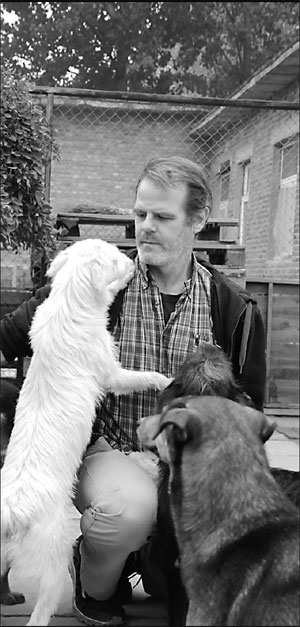His best friends here are four-legged
Updated: 2013-01-06 08:29
By Xu lin(China Daily)
|
|||||||
|
At the shelter, all the dogs have names. Barden remember them all and believes a good name help them to be adopted. Xu Lin / China Daily |

For Christopher Barden, 45, the best time of the day is when he visits his dog shelter, where dozens of animals bark to express joy and leap on him for attention and affection.
Located in suburban Beijing, the old yard is home to about 90 homeless dogs.
"I'm not an expert about dogs. But I'm very willing to do this stuff," says Barden in fluent Chinese. The Yale University graduate started to learn Chinese in 1989 and fell in love with the language instantly.
Last November, when he rented the place, he had 34 homeless dogs. Now, more are coming - some sent by friends, some saved by himself, some dumped at the gate of the shelter.
To better help these abandoned creatures, he has a Sina Weibo account Lingyang Xiaopu ("little adoption shop") with more than 50,000 followers. He often helps netizens to forward information about homeless dogs or cats that need saving or adopting, or a message from an anxious master seeking a lost pet.
The dogs have a carefree life in the daytime, and at night they sleep in different rooms, depending on their characters or tendency to fight.
"I feel very happy that after more than a year, only one dog died," he says.
When a new dog arrives, Barden at first checks whether it has infectious diseases, and takes it to the hospital to be vaccinated and sterilized. The newcomer will join the others after a quarantine period of more than 10 days.
Although there are volunteers to help, he's short-handed and hires two workers, a couple in their 50s, who live on site to look after the animals. Barden lives nearby and comes to help every day.
"They all like human beings very much, and they might fight due to jealousy if we are close to the other dogs," says 58-year-old Gao Delin.
"It's like taking care of babies. We have to be very careful and the dogs are really cute. Chris is a nice guy and he treats these dogs very well," Gao says.
All of the dogs have names, and Barden and the couple remember them all. "A more creative name increases their opportunity to be adopted," Barden says.
"It's most important to understand dogs. They are not robots and also have emotions," he says.
In 1997, Barden came to Beijing from the US and was an editor for a magazine. He's now a freelance translator for film scripts and subtitles.
In the early years, he only helped his friends foster dogs and cats. But he soon became a magnet for stray animals.
He focuses on freelance work about half the year so that he can spare as much time as possible on his charity work. He now spends an average of 10 hours every day updating his weibo and taking care of the dogs.
The shelter needs money for the rent, salary of workers, dog food and medical care. He does not take a salary.
"I often forget I'm a foreigner. Many kind-hearted Chinese have offered their help in the past years and I now feel Beijing is my real hometown," he says.
He offers pet adoption, and whatever information about the dogs that he can, for free.
He says most homeless dogs are both healthy and cute, so adopting should replace buying. One has to send the homeless dog to a hospital to ensure its health before raising it.
"Right now, my biggest dream is to start my own hospital, that would be focused on rescued animals, offering discounted or free services to people who want to help animals in need but can't afford it."
xulin@chinadaily.com.cn
(China Daily 01/06/2013 page5)
